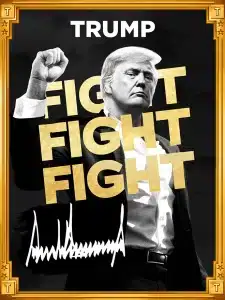Molly Minturn - My family is heartbroken to share that my father died in surgery on Monday, Feb. 10. It…
Cryptocurrencies November 2024-
Written by Diana Thebaud Nicholson // February 21, 2025 // Economy // No comments
The Worst of Crypto Is Yet to Come
No matter who wins in November, the digital-asset market could be on the brink of a deregulation-fueled bonanza.
By Christopher Beam
(The Atlantic) The total market capitalization of crypto assets this year has been within striking distance of its all-time highs in 2021. The crypto sector has been the biggest political donor in the current election cycle, surpassing even the fossil-fuel industry, with contributions flowing to candidates from both parties. In May, the House of Representatives passed a bill that included many of the policy demands of crypto lobbyists, while the Senate rolled back guidelines by the SEC designed to protect consumers of cryptocurrencies. And both presidential candidates have flirted with crypto enough that, no matter who wins in November, the market could be on the brink of a deregulation-fueled bonanza. -30 October 2024
21 February
Bybit Hit by Crypto’s Worst Hack With Almost $1.5 Billion Stolen
North Korean group Lazarus suspected by industry researchers
Prices of Ether, Bitcoin and other tokens decline after theft
(Bloomberg) In what may be the biggest crypto hack in history, crypto exchange Bybit said it lost almost $1.5 billion worth of tokens. A hacker took control of one of Bybit’s offline Ethereum wallets, Chief Executive Officer Ben Zhou announced in a social media post Friday, and an estimated $1.46 billion in assets flowed out. Founded in 2018, Bybit is one of the world’s largest crypto exchanges, processing more than $36 billion in daily average trading volume. The Dubai-headquartered platform had roughly $16.2 billion in assets on its exchange prior to being hacked, according to reserves data from CoinMarketCap. The hack surpassed the $611 million stolen from Poly Network in 2021. (As for who is responsible, researchers are already pointing the finger at North Korea.) Meanwhile, the rest of the crypto market took a really big hit as a result.
27 January
Robert Reich: Trump’s crypto-ligarchy
It will blow up in his face — and possibly take the financial system with it
Last week, the Securities and Exchange Commission altered its guidance so that financial institutions no longer have to account, on their own balance-sheets, for crypto assets held on behalf of customers. The SEC rolled back accounting guidance that had deterred banks from getting involved with crypto.
Trump has tapped the venture investor and digital currency enthusiast David Sacks to oversee administration policies on crypto (and artificial intelligence).
Thursday, Trump issued an executive order committing the Trump administration to “protecting and promoting” the crypto industry…
The order gives his administration authority to establish a national cryptocurrency stockpile — a stash of digital coins that the crypto industry has spent months lobbying the new administration for because it further legitimizes crypto and adds to the demand for it.
Trump’s order also prohibits the creation of a “central bank digital currency” overseen by the government. And the order promises “fair and open access to banking services” for crypto (responding to complaints from crypto companies that banks have denied them accounts).
In effect, Trump is writing the rules for a business venture from which he and his family are personally profiting. …
For oligarchs, the rise of digital finance provides large moneymaking opportunities. But for the rest of us, it increases the risk of another financial crisis.
Unbound greed combined with unconstrained power is an explosive combination. When the blowup comes, it will take Trump, Musk, and the oligarchy with it.
21 January
Trump Pardons Creator of Silk Road Drug Marketplace
Ross Ulbricht was serving a life sentence for creating a site in a shady corner of the internet to sell heroin, cocaine and other illicit substances.
… In its nearly three years of existence, Silk Road, which operated in a shady corner of the internet known as the dark web, became an international drug marketplace, facilitating more than 1.5 million transactions, including sales of heroin, cocaine and other illicit substances. … Despite his crimes, Mr. Ulbricht has remained popular with crypto enthusiasts because Silk Road was one of the first venues where people used Bitcoin to buy and sell goods.
20 January
The Crypto World Is Already Mad at Trump
The president’s new cryptocurrency is even too brazen for some of his supporters.
By Will Gottsegen
(The Atlantic) In a sense, the $TRUMP token represents a natural move for the president. He has made an enormous effort to position himself as a powerful ally of the crypto industry: Trump has said he plans to create a “strategic national bitcoin stockpile” and promoted another crypto business with his three sons just weeks before the election. Trump announced the coin on Truth Social on Friday night at the same time as the pre-inauguration “Crypto Ball,” a ritzy celebration emceed by David Sacks, a tech entrepreneur and podcast host whom Trump has tapped as his crypto czar. It was meant as a kind of debutante ceremony: After four years of what the industry has interpreted as targeted sanctions and harassment from SEC Chair Gary Gensler and other steely regulators, crypto is finally free to become the fullest version of itself.
Trump’s new meme coin soars on his first day in office, lifts other tokens
Trump meme coin soars in value
Launches raise regulatory and ethical concerns, analysts say
Trump company says Trump won’t be involved in family businesses
Bitcoin’s price rallies, sets record
(Reuters) – U.S. President Donald Trump’s new crypto token soared to more than $10 billion in market value on Monday, while enthusiasm over his crypto-friendly administration helped briefly lift bitcoin to a new record.
The expansion of Trump’s crypto interests comes as his administration is widely expected to usher in a “golden age” for cryptocurrencies, in stark contrast to the regulatory scrutiny the industry experienced under former President Joe Biden.
18 January
 Trump launches meme coin, apparently makes more than $25 billion overnight
Trump launches meme coin, apparently makes more than $25 billion overnight
(Axios) President-elect Trump launched his own cryptocurrency overnight and swiftly appeared to make more than $25 billion on paper for himself and his companies.
Why it matters: The stunning launch of $TRUMP caught the entire industry off-guard, and speaks to both his personal influence and the ascendancy of cryptocurrency in his administration.
It also speaks to the nature of the crypto industry that someone could have $25 billion worth of something that literally did not exist 24 hours previously.
Catch up quick: Friday night, while Trump was reportedly hosting a “Crypto Ball” for the industry in Washington, the president-elect launched his own meme-linked cryptocurrency.
Trump Begins Selling New Crypto Token, Raising Ethical Concerns
(NYT) The president-elect and his family have a direct and potentially lucrative stake in the sale of a cryptocurrency product that surged in value in the hours after going on sale, days before his inauguration.
7 January
The Great Crypto Crash
Trump will usher in a speculative frenzy.
By Annie Lowrey
(The Atlantic) The incoming Trump administration has promised to pass crypto-friendly regulations, and is likely to loosen strictures on Wall Street institutions as well.
This will bring an unheralded era of American prosperity, it argues, maintaining the country’s position as the head of the global capital markets and the heart of the global investment ecosystem. “My vision is for an America that dominates the future,” Donald Trump told a bitcoin conference in July. “I’m laying out my plan to ensure that the United States will be the crypto capital of the planet and the bitcoin superpower of the world.”
Financial experts expect something different. First, a boom. A big boom, maybe, with the price of bitcoin, ether, and other cryptocurrencies climbing; financial firms raking in profits; and American investors awash in newfound wealth. Second, a bust. A big bust, maybe, with firms collapsing, the government being called in to steady the markets, and plenty of Americans suffering from foreclosures and bankruptcies.
Having written about bitcoin for more than a decade—and having covered the last financial crisis and its long hangover—I have some sense of what might cause that boom and bust. Crypto assets tend to be exceedingly volatile, much more so than real estate, commodities, stocks, and bonds. Egged on by Washington, more Americans will invest in crypto. Prices will go up as cash floods in. Individuals and institutions will get wiped out when prices drop, as they inevitably will.
The danger is not just that crypto-friendly regulation will expose millions of Americans to scams and volatility. The danger is that it will lead to an increase in leverage across the whole of the financial system. It will foster opacity, making it harder for investors to determine the riskiness of and assign prices to financial products. And it will do so at the same time as the Trump administration cuts regulations and regulators.
2 January
Crypto’s Unholy Choir
Andrés Velasco, a former finance minister of Chile, Dean of the School of Public Policy at LSE
Ever since bitcoin was launched a decade and a half ago, crypto has been a solution in search of a problem. What is new is the chorus of deceivers, demagogues, dictators, and tax dodgers trying to convince us otherwise.
(Project Syndicate) … The dream that is coming true – the liberation of the crypto industry from the shackles of excessive regulation – will supposedly allow humanity to flourish. That sounds great, except that regulation of crypto remains somewhere between light and non-existent, and crypto industry captains have yet to tell us what massive benefits await us. In fact, even small benefits are nowhere to be found. Bitcoin has been around for 16 years, and you still can’t buy a cup of coffee with it, much less go shopping online. The claim that crypto will replace fiat currencies looks increasingly implausible, but that hasn’t stopped boosters from touting other promises.
In fact, even small benefits are nowhere to be found. Bitcoin has been around for 16 years, and you still can’t buy a cup of coffee with it, much less go shopping online. The claim that crypto will replace fiat currencies looks increasingly implausible, but that hasn’t stopped boosters from touting other promises.
2024
12 December
(Bloomberg) Bitcoin just notched another win of sorts. BlackRock, the world’s biggest asset manager, says the cryptocurrency does have a place in multi-asset portfolios—to a point, anyway. … Bitcoin has been on a high since the election of Donald Trump—and his subsequent nomination of crypto fan Paul Atkins to be chair of the Securities and Exchange Commission—soaring above $100,000. Although BlackRock’s memo provides a potential blueprint for investors “who are tolerant of Bitcoin’s risk,” they nevertheless should remain wary of scams amid the digital currency’s ongoing boom. Scammers have done exceedingly well for themselves in the past year (about $5.6 billion was lost to crypto fraud in the US last year, according to the FBI), in part because so many investors think crypto is a way to get rich quick. —Jordan Parker Erb
11 December
Crypto’s Legacy Is Finally Clear
An anti-establishment technology for an anti-establishment age
By Charlie Warzel
(The Atlantic) Crypto is a technology whose transformative product is not a particular service but a culture—one that is, by nature, distrustful of institutions and sympathetic to people who want to dismantle or troll them. The election results were at least in part a repudiation of institutional authorities (the federal government, our public-health apparatus, the media), and crypto helped deliver them: The industry formed a super PAC that raised more than $200 million to support crypto-friendly politicians. This group, Fairshake, was nonpartisan and supported both Democrats and Republicans. But it was Donald Trump who went all in on the technology: During his campaign, he promoted World Liberty Financial, a new crypto start-up platform for decentralized finance, and offered assurances that he would fire SEC Chair Gary Gensler, who was known for cracking down on the crypto industry. (Gensler will resign in January, as is typical when new administrations take over.) Trump also pledged deregulation to help “ensure that the United States will be the crypto capital of the planet and the bitcoin superpower of the world.” During his campaign, he said, “If you’re in favor of crypto, you’d better vote for Trump.” At least in the short term, crypto’s legacy seems to be that it has built a durable culture of true believers, techno-utopians, grifters, criminals, dupes, investors, and pandering politicians. Investments in this technology have enriched many of these people, who have then used that money to try to create a world in their image.
6 December
Donald Trump picked venture capitalist David Sacks to become the White House’s AI and crypto policy champion. In Sacks, a former PayPal exec, Trump is tapping one of his most prominent Silicon Valley supporters and fundraisers, with the aim of making America the “clear leader” in both areas.
New role will help reshape U.S. policy on digital currency
Early evangelist for cryptocurrency
Move comes after bitcoin soared above $100,000 for first time
(Reuters) – U.S. President-elect Donald Trump on Thursday said he was appointing former PayPal Chief Operating Officer David Sacks as his “White House A.I. & Crypto Czar,” another step towards overhauling U.S. policy.
“He will work on a legal framework so the Crypto industry has the clarity it has been asking for, and can thrive in the U.S.,” Trump said in a post on his social-media site Truth Social.
The crypto czar and other officials in Trump’s incoming administration such as the chairs of the Securities and Exchange Commission and Commodity Futures Trading Commission are expected to reshape U.S. policy on digital currency along with a newly created crypto advisory council.
Trump’s tech backers generally want to see minimal regulation around artificial intelligence and cryptocurrencies such as bitcoin, saying Washington would throttle growing innovative sectors with excessive rules. …
Trump announced on Wednesday that he was nominating prominent Washington lawyer and crypto advocate Paul Atkins to lead the SEC, in a move celebrated by the industry.
Trump – who once labeled crypto a scam – embraced digital assets during his campaign, promising to make the United States the “crypto capital of the planet” and to accumulate a national stockpile of bitcoin.
19 November
(The Atlantic) Just 50 days before his reelection, Donald Trump took the time to hawk a new crypto platform.
If the country does not build out its cryptocurrency ecosystem, “we’re not going to be the biggest, and we have to be the biggest and the best,” Trump said on a livestream on X. “It’s very young and very growing. And if we don’t do it, China’s going to do it.” The livestream was sponsored by World Liberty Financial, which has given Trump the title “chief crypto advocate” and his sons, Barron, Eric, and Donald Jr., that of “Web3 ambassador.”
World Liberty Financial is the brainchild of Zak Folkman (the creator of an advisory firm called Date Hotter Girls LLC) and Chase Herro (an affiliate marketer who previously sold colon cleanses). It is a get-rich-quick scheme, and not one that seems designed to enrich its customers.
It is also an emblem of a financial world that Trump’s election seems set to supercharge, populated by young men who have seen their economic prospects stagnate, their faith in the United States falter, and a champion in a baggy business suit and a red baseball cap emerge. Think of it as the bro-economy: a volatile, speculative, and extremely online casino, in which the house is already winning big.
14 November
The crypto industry poured hundreds of millions of dollars into this election cycle.
What Crypto Wants From Trump
With a crypto-friendly president-elect and a Congress stacked with crypto supporters, the industry is getting closer to its ultimate goals.
By Lora Kelley
(The Atlantic) Much of the news about crypto in the past few years has been a mix of market crashes and CEOs going to prison. But the political events of recent weeks are offering crypto new hope: The industry, which poured at least $245 million into this election cycle (accounting for nearly half of all corporate donations to federal elections by August), will now have hundreds of sympathetic officials in office. Although crypto PACs seem to have stayed out of the presidential race, the industry is already reportedly lobbying Trump and his allies hard for favorable regulations, and is likely to enjoy broader influence in the Washington of Trump. He once denounced bitcoin as a “scam,” yet during his latest campaign, he began to embrace crypto, rolling out a crypto platform this fall and likening the technology, for some reason, to “the steel industry of a hundred years ago.”
The crypto world is using this new leverage to ask for what it wants, which is chiefly to see Gary Gensler, the Securities and Exchange Commission chair who has tried to crack down on the industry, fired (Trump promised to do as much during his campaign). It’s also working to defang other harsh enforcement efforts: As my colleague Christopher Beam wrote last month, crypto leaders are being strategic, asking for certain regulations that are still favorable to their companies’ growth. “The industry’s message now: Make crypto normal. Regulate us, please. All we want is to know the rules of the road,” he wrote.
13 November
Crypto legislation likely coming under Trump, ex-SEC chief says
(Reuters) – Congress is likely to adopt legislation governing cryptocurrencies during President-elect Donald Trump’s administration, Jay Clayton, a former top Wall Street regulator and potential political appointee, said on Wednesday.
Clayton also said he favored easing regulatory burdens to encourage companies to go public, remarks foreshadowing broad-based changes in public policy now anticipated by industry, which spent heavily to influence this month’s elections.
8 November
The Crypto World’s Victory Lap Begins
The industry made a $135 million bet on the election. It paid off spectacularly.
(Bloomberg) …as recently as last year[, r]egulators were circling, and token prices had yet to recover from a crash that saw investors lose billions of dollars. Sam Bankman-Fried, the onetime face of the industry, was on trial for fraud, and as far as anyone knew, Trump’s position on Bitcoin was what he told Fox Business in 2021—that it was a “scam.”
But in September 2023, with the industry’s reputation at a low point, Brian Armstrong, the billionaire founder of Coinbase Global Inc., laid out a plan for crypto to gain power in Washington. Three months earlier, Armstrong’s company had been sued by the Securities and Exchange Commission, which took the position that much of the trading that had been going on there for years was illegal. The suit, along with similar ones against other major players, seemed to threaten the end for crypto, at least in the US.
Armstrong, speaking at the Mainnet conference in New York, said he was optimistic the industry could get the government to institute more favorable rules. The key, he said, was money. To become a real political player, crypto would have to increase its donations exponentially, matching what Wall Street or the oil and gas industries give—at least $50 million a year.
By the 2024 election cycle, Armstrong had easily surpassed his funding goal. Crypto companies had donated more than $200 million to [crypto super PAC] Fairshake and affiliated groups, led by Coinbase with $75 million, making crypto the biggest-spending industry in politics. Fairshake started spreading that money around to congressional candidates of both parties, taking credit for helping defeat House members Katie Porter and Jamaal Bowman in Democratic primaries.



